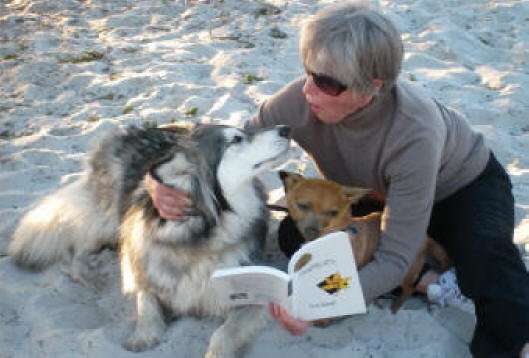|


Dear Dr. Baum
--
I love
my little Yorkie, but he is getting on in years, and I have to face
the fact that he will be leaving our planet sometime soon. I
have heard an awful lot about cloning, and would like your advice.
Would it be possible to clone my little Walter? And would it
be a good idea?
Many
thanks for your advice,
Sandra R, Chicago, IL
Dear Sandra:
Within the next few months pet
owners will be exposed to the opportunity to clone their pets. I
was informed so last week by a representative of a company called
"Forever Pet" who extolled the virtues of this developing science.
The initial fees for obtaining live tissue for cell banking will
cost approximately five hundred dollars and there is a monthly
storage fee of $19.95. The actual cost of doing the cloning is a
bit fuzzy at the moment but the company anticipates that the process
will be economically viable at a cost of around three thousand
dollars--- beginning in the year 2007. To date, a cat has been
successfully cloned and a dog clone may be perfected within a year.
So at this point, the company isn't really a cloning company-- it's
in the business of cell banking, waiting for the day that the actual
cloning process is commercially available.
I pride myself on being a consumer
advocate, very protective of my clients, wary of the scams that are
used when the emotional vulnerability of a pet owner can be
exploited. Several interesting facts emerged from the discussion
with Forever Pet. The industry is not regulated and no licensure of
facilities is in place. Most of the research being done is being
coordinated through the veterinary colleges at the University of
Pennsylvania and Texas A&M. Professors at both institutions
confirmed the validity of their research, but stated that the final
product was several years away.
I had been concerned when I was told
that more than half the tissue specimens being preserved for their
living DNA had been obtained from elderly pets on the verge of dying
or from pets that had died within 48 hours of obtaining the tissue.
My concern was that this old DNA would have a head start on
deterioration in the bodies of the new clones thus dramatically
effecting their life spans. Happily the scientists agreed that
although genetic material from young donors was easier for them to
grow, the actual effects on longevity of the clone were minimal.
The Texas researchers were taking
the cloning process one step further. They were trying to purrfect
a cat that was hypoallergenic! They had identified a protein in the
saliva of the cat, which they claim is the primary stimulant for
allergic responses in people. What is more, however, is that they
have specifically identified the gene that produces this protein,
and by removing that gene, the cat would produce saliva free of the
protein thus rendering it non-allergenic.
There is no doubt in my mind that
this process will be perfected. I have no moral objections to
cloning as it is the logical extension of the genetic selection that
we presently do to increase the productivity of our livestock or the
function and beauty of our pet animals. My real concern is whether
the expectations arising from the cloning can ever be truly met. So
much of our relationship with a special pet is dependent on the
circumstances in which we find ourselves. It is no mere coincidence
that the pets that I have bonded with so strongly were an English
Bulldog named PIF (Pushed In Face) who was my constant companion in
my single days and the present love of my life, Fessie (the cutest
French Bulldog) who came on the scene as my wife, Linda, and I
became empty nesters. The excitement and uniqueness that evolves
from your relationship with your pet may be the singlemost argument
yet against trying to relive your past with a clone. As much as I
have, and do, enjoy the pets in my life, it is the distinctiveness
of the bond that has me looking forward to new experiences in the
future.
NEXT COLUMN:
Surprise topic!
|







